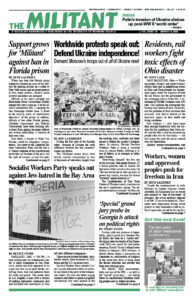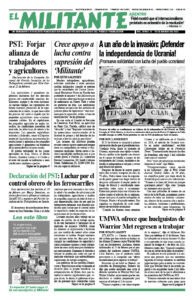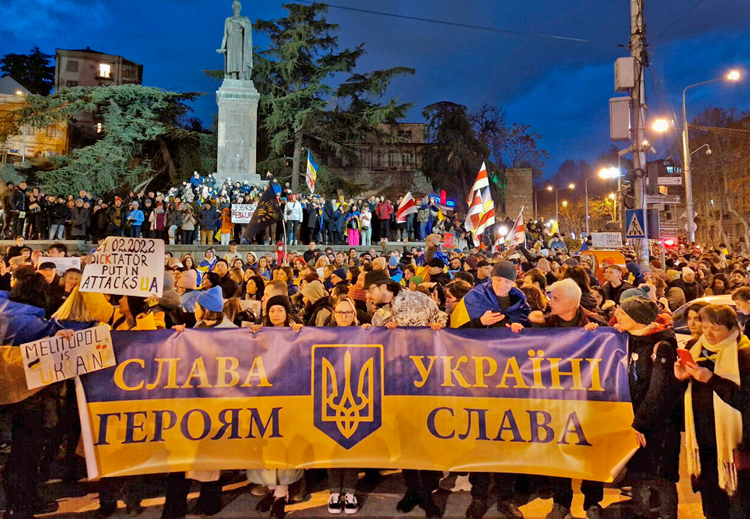During the first year of the Russian rulers’ invasion of Ukraine the stark difference between the two countries’ armies has grown.
The Ukrainian armed forces have fiercely resisted, strengthened by tens of thousands of volunteers, largely from the working class, confident and determined to defend the country’s independence. In contrast, Russian President Vladimir Putin is using a conscript army as cannon fodder, suffering a series of defeats as he attempts to subjugate Ukraine.
“Everything changed” the first day of the invasion, Oleksander Protsuk, 27, a former plumber, told Al Jazeera. He had never before served in the army, but “the war forced me to take up arms, to protect my country, because the former ‘brotherly’ nation attacked us.”
The Confederation of Free Trade Unions of Ukraine issued a statement on the war’s anniversary, saying “the unprovoked military invasion” by Moscow has caused enormous damage across the country. “Thousands of schools, hospitals, and industrial enterprises” have been destroyed, throwing workers out of a job.
“I lost many childhood friends,” Kyrylo Borysenko, 23, another soldier said. Despite the hardships working people face, from unemployment and inflation, “people are united, they stand for each other.
“We’re from Ukraine, you can’t break us, because our spirit is strong.”
While Moscow’s forces have been forced back from over half the area they occupied early in the war, they still control 17% of Ukraine. Putin is trying to regain the offensive by replenishing his army with hundreds of thousands of reservists and Wagner battalion former prisoners called up late last year. Sent to attack in human waves, they are suffering heavy losses on the eastern front.
Nonetheless, his forces are inching closer to encircling the fiercely contested town of Bakhmut. Forcing the Ukrainian garrison to withdraw would give Putin his first battlefield advance after months of setbacks.
Most Russians don’t support the war
Putin’s war was never popular among working people in Russia. Now with tens of thousands of coffins coming home, pressure on him is growing. The regime held stage-managed rallies on the war’s one-year anniversary compelling people to attend.
“We have to go and there’s nothing we can do about it,” a state employee, who requested anonymity, told the Moscow Times, at a rally in the capital where Putin spoke Feb. 24. Authorities are using the event “as a propaganda tool.” A group of teachers told the BBC they were pressured to go by their bosses.
“I’ll be here for a while and then I’ll leave,” said a worker from the city’s metro transit system. “I think most people here don’t support the war. I don’t.”
The crowd at the front waved Russian flags and sang patriotic songs. One lyric, “Made in the U.S.S.R.,” opened with the words, “Ukraine and Crimea, Belarus and Moldova, it’s all my country.” Putin aims to recreate the Russian empire that existed under the czars by forcibly incorporating these nations, which he claims are Russian lands inhabited by Russian people.
Also marking the anniversary, people across Russia held anti-war protests. Some participants displayed Ukrainian blue-and-yellow ribbons. Dozens of people were detained in 14 Russian cities.
A woman in Irkutsk, Siberia, held a placard that read, “I demand the withdrawal of Russian troops from Ukraine!”
In St. Petersburg, Ivan Popov was arrested after holding a “No to war” sign next to the Bronze Horseman, a statue of Czar Peter I, known in Russia as Peter the Great. Elena Osipova, the well-known 77-year-old artist, held posters reading “No to war” and “Putin is war” in front of that city’s Kazan Cathedral.
In the Leningrad region, Dmitry Skurikhin painted anti-war slogans on the walls of his store in the village of Russko-Vysotskoe.
The administration at the Sovremennick Theatre in Moscow canceled its performance of “The Gin Game,” starring Liya Akhedzhakova. The actress has repeatedly called for Putin to end the war. After performances members of the audience have thanked her for her stance.
Actions also took place from Vladivostok and Khabarovsk in the Far East to Yekaterinburg in the Urals and from the Arctic port of Murmansk to Tomsk and Kazan across central Russia.
Washington advances own interests
President Joseph Biden marked the invasion’s anniversary by extending the U.S. rulers’ sanctions against Russia, which fall hardest on working people and undermine the building of solidarity between workers in Russia and Ukraine. Like rival capitalist powers, Washington responds to the war by seeking to advance its own strategic interests.
With the U.S. rulers’ tacit approval, the U.K. government backed by the governments of France and Germany offered a post-war security pact to Kyiv. This is to try to induce Kyiv to settle for less than fully restoring Ukraine’s territorial integrity. French President Emmanuel Macron says his government will help Ukraine win, but he has continued to meet with Putin and echoes the Russian ruler’s pretexts for the invasion, saying that Moscow fears the expansion of NATO threatens Russia. Now he plans to fly to China to push for a peace deal.
The Kremlin says it will never give up the parts of Ukraine it has seized. In contrast, Ukrainian President Volodymyr Zelensky said only his government, of the country that has been invaded, can decide the terms on which the war will end.
The determination of Ukrainian working people to repel Moscow’s forces from every inch of Ukrainian territory has strengthened since the start of the war.


